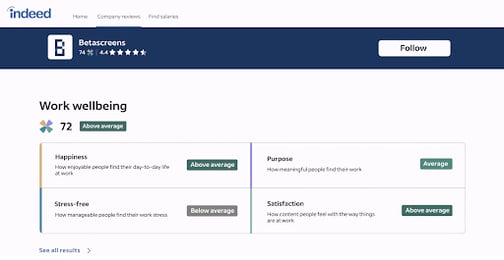Key Takeaways:
- Employee wellbeing in the workplace has become increasingly important for job seekers.
- Wellness and wellbeing programs positively impact job satisfaction.
- Measuring and understanding wellbeing is crucial for attracting and retaining talent.
- This article introduces Indeed's Work Wellbeing Score, which aims to measure how people feel at work to help companies understand how their workforce authentically feels about them.
During the last few decades, issues relating to employee wellbeing in the workplace have become increasingly prominent. According to the U.S. Department of Health and Human Services (HHS), 84% of respondents said their workplace conditions had contributed to at least one mental health challenge, and 81% of workers reported that they will be looking for workplaces that support wellbeing initiatives in the future. Also, in a recent Monster.com poll, 86% of workers said that work wellbeing was extremely important to them, and 57% felt that maintaining work-life balance was the most important aspect of wellbeing in the workplace.
Part of the heightened awareness around wellbeing has been due to the medical sciences increasing their knowledge about the effects of stress on the human mind and body. At the same time, other concerns relate to changes in overall culture and things that candidates and workers prioritize in the workplace.
Lockdowns and the Great Resignation underscored the value workers place on wellbeing in their employment. This revolution has led to a dramatic shift in the recruiting and hiring dynamic and renewed interest in the impact of work-life balance and wellbeing in the workplace.
LaFawn Davis, SVP of ESG at Indeed, shares, “The future of work conversation cannot happen without employee wellbeing being at the center of it.”
It's no longer simply about compensation. As companies and recruitment marketing professionals are quickly discovering, candidates are becoming more discriminating in their job searches and finding roles that align with their motivators. Today, candidates want to dig more deeply into the companies they're applying to in order to see what values they promote and if they align with their own values. The future of work conversation cannot happen without employee wellbeing being at the center of it.

The Importance of Wellbeing in the Workplace
Forbes released data on the increasing importance of wellness (health) and wellbeing amongst job seekers and employees. Their research highlighted statistics on health and wellbeing programs relating to employee recruitment and retention. Their findings indicated that:
- 87% of employees considered wellness and wellbeing when choosing an employer.
- 67% of employees who worked for organizations with wellness and wellbeing programs liked their jobs more; the same percentage was “extremely” or “very likely” to recommend their employer to others.
- Nearly 54% of Gen Zers and 58% of millennials considered company health and wellbeing programs “important” or “extremely important” when making a job decision.
- 45% of employees working at small to medium-sized companies said they would stay at their jobs longer because of their employers’ wellness and wellbeing programs.
A study by Modern Health revealed that 79% of employees surveyed would be likely to stay at companies that provided high-quality mental health resources, an increasingly important component to wellbeing in the workplace.
Yet, despite the above findings, only 40% of employers prioritize wellbeing initiatives within their overall benefits strategy, and only 25% of organizations are leveraging their benefits programs to recruit employees (Forbes).
Employee WellBeing –Then and Now
The concept of wellness has evolved significantly in the corporate world. In the past, it was merely a trendy topic for companies to discuss. However, what was once true no longer holds today. Previously, being a "good employee" meant showing up to work even when sick and avoiding conversations about mental health. Fortunately, the workforce has gradually dismantled the stigma associated with these issues. People are now more willing to prioritize their wellbeing by staying home when ill, and companies are actively encouraging team check-ins.
This shift has occurred naturally over time, driven by the expectations and motivations of today's workforce. Wellness is now intricately woven into the fabric of companies, with leaders recognizing the collective importance of taking care of their employees. Personal wellbeing is no longer a superficial aspect of employment; employees expect their companies to genuinely focus on fostering a culture of care.
It is crucial for organizations to assess how supportive they truly are and acknowledge the value employees place on wellness in their work environment. Also, companies need to showcase their dedication to wellness by ensuring employees can trust that the benefits being offered to them are there to use and not for show.

Why Indeed is Implementing a Work Wellbeing Score
Indeed has implemented the Work Wellbeing Score to measure how people feel at work. This is crucial since aspects of wellbeing have become a high priority amongst job seekers and workers, and it’s becoming increasingly important for them to have this visibility when seeking employment opportunities. Some important considerations for employers include:
- Fair pay and flexibility are now considered foundational needs for workers.
- Stress, lack of satisfaction, and lack of happiness are key reasons that drive people to find better opportunities.
- 80% of people say it’s important to see information about employee wellbeing when considering working at a company.
- 82% of job seekers say finding a company that cares about how they feel is important.
- How employees feel at work directly impacts how they perform – and even the company's success down the line.
Identifying Key Drivers of Work Wellbeing
According to Indeed, the key indicators of wellbeing at present are:
- Happiness
- Purpose
- Stress
- Satisfaction
In addition to these measures, additional drivers that influence and shape an employee’s sense of wellbeing at work include such things as:
- Foundational needs: Fair pay, trust, and flexibility
- Social needs: Belonging, inclusion, support, and appreciation
- Growth needs: Learning, achievement, and energy
As the value of work-life balance and wellbeing have increased in the minds of job seekers and workers, measuring and understanding wellbeing has become vital to attracting and retaining talent.
Indeed’s Work Wellbeing Score
In answer to the increasing importance of wellbeing, Indeed leveraged the comprehensive research in which it has participated over the years (combined with its recent study) to formulate their Work Wellbeing Score, a composite metric of the key wellbeing outcomes of happiness, purpose, stress, and satisfaction. Indeed says, “We also measure and display key drivers that lead to wellbeing at work: accomplishment, appreciation, belonging, energy, fair pay, flexibility, inclusion and respect, learning, support and encouragement, trust, and being well-managed.”
On Indeed’s website, work wellbeing data will be available on an employer’s Company Page once at least ten responses each in the categories of happiness, purpose, satisfaction, and stress. Each survey question will be answered using a five-point scale, with one being strongly disagree and five being strongly agree.
When enough surveys are completed, the Work Wellbeing Score results will be averaged to produce one metric and will appear in the employer’s snapshot section.

Source: Indeed
The Work Wellbeing Score shares the linkage of all the work that companies have been doing in recent years when it comes to wellness practices, and allows them to highlight their dedication to fostering a supportive culture.
What this Means for Employers
Finding workplaces that are inclusive, respectful of everyone, and foster wellbeing are growing priorities for job seekers. With this, using the Work Wellbeing Score will help companies understand how their workforce authentically feels about the companies and their place in them. Companies must check in regularly with employees and encourage teammates to review and share their experiences with the company.
By focusing on the specific wellbeing drivers that Indeed has amassed over the years, companies can build a stronger culture of wellbeing. Assessing the culture of wellbeing in these organizations can help decision makers enhance their workers’ sense of happiness, purpose, stress, and satisfaction. They can also determine how effective their initiatives, offerings, and policies are and how they impact wellbeing outcomes.
According to Indeed, the best way for companies to improve their Work Wellbeing Scores is by taking action. Initially, this involves checking in on reviews, tracking performance over time, improving what isn’t working, and showcasing strengths by maximizing the employer brand.
Leveraging Wellbeing Data
With the availability of relevant wellbeing metrics, employers can now ask themselves how their initiatives, offerings, and policies impact wellbeing outcomes. They can now leverage data to tell a story about where they are currently regarding wellbeing initiatives in the same way they track other candidate and worker behaviors, and receive guidance as they build a strategy for the future. Then, hiring professionals can craft and implement wellbeing initiatives based on the data.
A holistic view of data relating to wellbeing will ensure the company understands the measures that need to be taken to ensure progress and growth happen – which helps foster a strong employer brand.

Auditing the EVP and Employer Brand
The employer value proposition (EVP) is an essential business tool that highlights an organization's unique and attractive qualities and sets it apart from the competition. For candidates, it answers the question of what makes a company the ideal choice for employment. To create a robust EVP, companies and recruiters must understand what employees and job seekers value the most and how that compares to competitors.
In representing aspects of wellbeing within the EVP, companies need to include wellbeing initiatives on their company profiles and in their advertising and marketing materials. Based on findings from the data, companies can use this to adjust their EVP/EB and how they showcase this information externally. These days, job seekers are looking for authentic content and information from companies, and engaging employees in promoting its wellbeing initiatives is a great way to communicate this to candidates.
Change may not happen overnight, but the Wellbeing Score is a great way for companies to begin the work!
—--
Of those who reported a higher level of wellbeing at work, 87% said they would likely stay at their current employer for the next 12 months. As employers respond by accommodating changing values, work-life balance, and wellbeing through new initiatives, tools like Indeed’s Work Wellbeing Score can help standardize wellbeing concepts and aid companies in enhancing their employer brand and attracting top talent.
We understand the significance of your employer brand in driving the success of your hiring efforts. That's why we collaborate closely with you to craft a captivating employer brand and employee value proposition. Our goal is to create an EVP that is not only compelling and inspiring, but also distinctively reflective of your organization.
If you’d like to learn more about Indeed’s Wellbeing Score or how your company can elevate their employer brand/EVP, reach out to Recruitics!


